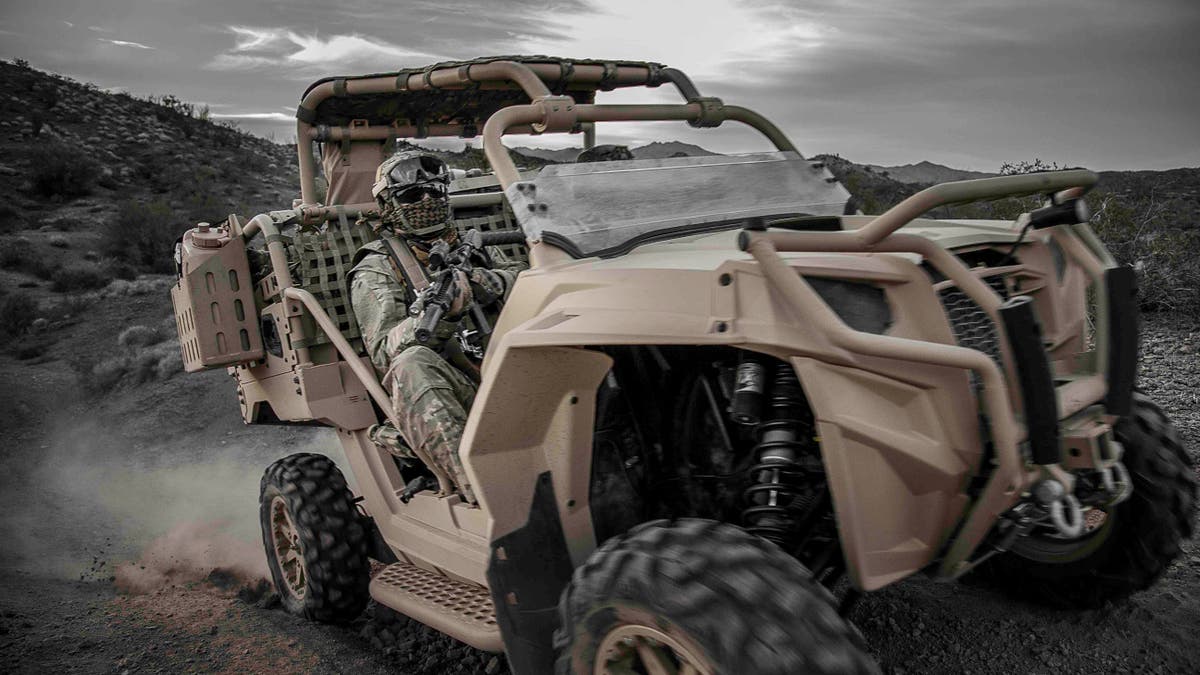
The Polaris Defense Ultralight family of vehicles. (John Linn, Adventures Studios 2014) (© John Linn, Adventure Studios 2014)
It was a good year for innovations within the military, including the introduction of a gladiator vehicle a drone-slaying canon. Here are a few of the good ones:
Special Operations ATV
Who doesn’t love an all-terrain vehicle? U.S. Special Operations Command (SOCOM) is no exception.
Polaris Defense announced that it is supplying the U.S. military with more all-terrain vehicles (ATVs) in 2015.
Related: Four new military aircraft took to the skies in 2015
The company has been supplying its MRZR ATVs to SOCOM for three years – and now special operations are getting their hands on even more.
The new order is for MRZR2 and MRZR4s. The MRZR2 is an ideal variant to carry two operators and the MRZR 4 can carry four, or even six, depending on the configuration.

Polaris Defense MRZR2 (© John Linn, Adventure Studios 2014)
Ultra-light vehicle mobility will continue to be a key capability for U.S. special operations missions. And these ATVs are decked out.
They feature on-demand, advanced all-wheel drive. When more traction is needed, the vehicle automatically engages all four wheels and can automatically revert back to two-wheel. This advanced tech translates into more power when an operator needs it on a mission and also less general wear and tear on the vehicle.
Warships of the future
What will warships look like in three decades? Meet the HMS Dreadnought.
Related: Can the US military build Star Wars-style laser cannons for its troops?
The British Ministry of Defence and Royal Navy challenged young scientists and engineers to design a future warship, the Dreadnought 2050 – named in honor of the 1906 HMS Dreadnought, a Royal Naval battleship that eclipsed all other warships at the time.
Dreadnought 2050, made of futuristic material, features state of the art weapons, command center and more. The ship’s structure is made of ultra-strong acrylic composites that can be turned translucent so that crew can see through it.
From the Ops Room, commanders can see through the hull and watch close-in battles play out.
The new Dreadnought would be equipped with a range of state-of-the art weapons like high-velocity torpedoes, speed-of-light weapons and drones constructed on the ship using 3D printers.
At the bow, there will be an electromagnetic railgun that can fire projectiles as far as long-range cruise missiles can go today.
Along the sides of the ship, there are missile tubes. These tubes can launch missiles faster than Mach 5 – a hypersonic speed. The futuristic vessel is also equipped with directed-energy weapons, which emit focused energy, to thwart incoming threats.
In the outrigger hulls, there are torpedo tubes that fire supercavitating torpedoes that travel at more than 300 knots. Supercavitating torpedoes can travel at such speeds because they move through water in a sort of air bubble that reduces drag and friction.
AJAX
A heavily armored vehicle fit for a colossal Greek legend was revealed in 2015.
The turreted AJAX heavily armored Scout Specialist Vehicle prototype was unveiled by General Dynamics.
Related: Are 'Star Wars'-style fighter jets coming to the skies?
Ajax, for those of you not familiar with Greek mythology, was a formidable warrior characterized by his colossal size, strength and honor, and served in the Trojan War. A warrior in Homer’s ‘Iliad,’ one of Ajax’s hallmarks was a powerful shield.
This tank brings a stabilized 40mm Case Telescoped Cannon and a 7.62mm coaxial machine gun to the fight. It can carry a crew of four.
AJAX will give it more armor, more sensors, more firepower and more maneuverability. The tank also has a two-person turret that was developed by Lockheed Martin. It is destined to provide ISTAR (Intelligence, Surveillance, Target Acquisition and Recognition) and give commands maximum reconnaissance data.
Last year, General Dynamics won a contract to build 589 Scout SVs for the British Army. The first ones will arrive in 2017 with all of them delivered by 2024.
AJAX is part of a family of next-gen armored fighting vehicles. Its siblings have names like Athena, Ares, Apollo, Argus and Atlas drawn from Greek lore.
Drone Slaying Cannon
Drones are increasingly flying the skies. Looking for a way to slay them? Silent and invisible, Boeing’s new laser cannon destroys them in under a minute.
The Compact Laser Weapons System (CLWS) can track down an unmanned aerial vehicle (UAV) and eliminate a threat.
The two-kilowatt laser focuses a directed-energy beam at a target. Silent and invisible, it’s so precise that it can target a specific location on a drone.
The system can identify and track air and ground targets as they are moving using a mid-wave infrared sensor and has a range of about 25 miles.
The laser is controlled with an Xbox 360–like controller connected to a laptop equipped with the targeting software. It takes just two warfighters to move the laser around the battle space and deliver focused firepower. The laser can be moved in a few boxes and set up within a few minutes.
Last Chance Gun
If a missile slips past a ship’s defenses, then the rapid-fire gun system Phalanx destroys the threat before it can strike - the “last-chance” defense system for military vessels.
In 2015, the U.S. Navy acquired $159.9 million dollars more of Raytheon’s Phalanx Close-In Weapons System (CIWS).
Phalanx’s 20 mm gun system automatically tracks and destroys enemy threats with computer-controlled radar. Phalanx provides close-in defense against air, land and sea threats.
This weapons system can take on a range of threats from anti-ship missiles to fixed-wing aircraft and helicopters. At sea, Phalanx can also defeat fast-travelling surface craft.
The U.S. Army uses the land-based Phalanx as part of its systems to counter rockets, artillery and mortars. Before a threat can hit a ground target, Phalanx detects and destroys incoming rounds in the air.
